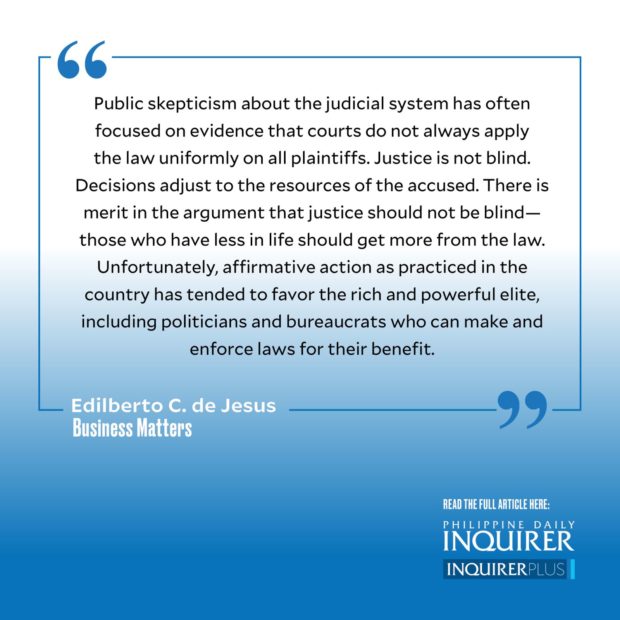Why do some peasant communities rebel against their economic and political overlords and others don’t? One explanation focuses on the peasantry’s understanding of their “moral economy.” Peasants develop a collective sense of which obligations demanded by superiors are reasonable and should be accepted, or oppressive and must be resisted. Those unschooled in the law, I suggest, form a comparable moral perspective on the legal system. Hollywood has prospered on Charles Bronson vigilante movies. Erap Estrada’s serial films on bandits, driven to violate the laws in their search for justice, paved his path to the presidency.
Why should murderers or drug dealers escape conviction because police failed to read them their Miranda rights? Over time, however, people have come to accept the importance of observing such technicalities; they help prevent law enforcers from abusing their powers. Where fundamental, constitutional rights to freedom and life guaranteed to everyone are at stake, particularly where impunity is a problem, technicalities are critical and must be respected. How then might the moral sense of us commoners appreciate the case for the cancellation of the certificate of candidacy (COC) of Ferdinand Marcos Jr. to run in the 2022 presidential elections?
First, people will not equate the privilege of competing in elections with constitutional rights to life and liberty. Public office is an opportunity open only to those who meet the prescribed standards, including compliance with laws whose violation is precisely punishable with the loss of this privilege. Second, people will compare how the courts decided comparable, earlier cases. Supreme Court justices expelled chief justice Meilou Sereno from her post because she could not provide the SALNs when she was a UP law professor. Is this as serious as the Marcos Jr. conviction for tax evasion? But the SALN technicality and the recourse to the quo warranto, assailed by professional legal associations and the most respected law schools in the country, prevailed.
Public skepticism about the judicial system has often focused on evidence that courts do not always apply the law uniformly on all plaintiffs. Justice is not blind. Decisions adjust to the resources of the accused. There is merit in the argument that justice should not be blind—those who have less in life should get more from the law. Unfortunately, affirmative action as practiced in the country has tended to favor the rich and powerful elite, including politicians and bureaucrats who can make and enforce laws for their benefit.
The Regional Trial Court imposed prison sentences of up to three years each on Marcos Jr. for non-payment of taxes. Without any explanation, the Court of Appeals omitted the prison sentence. Marcos Jr. has not produced proof that he had complied with the CA judgment. Transparent and uniform application of the law is a third public concern.
Affirmative action should work so that government policies and court decisions strengthen democracy. The Commission on Elections recently ruled that a political party can replace a candidate who withdraws up to midday of election day with a substitute carrying the same surname. This latitude for substitution is allegedly necessary so that the withdrawal of candidates will not disenfranchise the constituencies the parties represent. The argument may hold in democracies where parties actually stand for distinct sectoral and political values and interests.
Our political parties are just-in-time platforms hastily improvised for personalities seeking election. The “winnable” candidate chooses the party. Policy and legal decision-makers must go beyond theoretical assumptions on how democracies should function and evaluate how their rulings will impact the political system as it actually operates. Rather than reinforcing popular democracy, the Comelec rule enables political dynasties to wait until the last minute before determining which relative the surname in the ballot will represent. Consider also the party-list initiative and how politicians have perverted the objective of making the legislature a more representative, inclusive body.
Decisions justified by pious platitudes about defending democratic choice deserve critical analysis that must consider how their intent and outcomes serve to entrench more deeply the power of ruling politicians and their families. In some electoral districts, no one dares to run against dynasty candidates like Gloria Arroyo. What choice is left to voters?
——————
Edilberto C. de Jesus is professor emeritus at the Asian Institute of Management.
——————
Business Matters is a project of the Makati Business Club (makatibusinessclub@mbc.com.ph).
